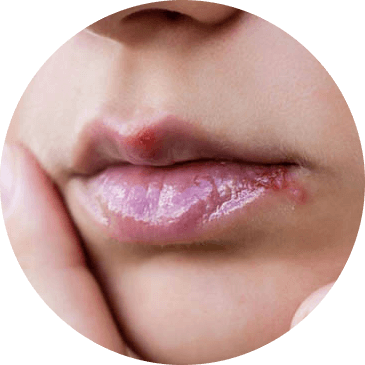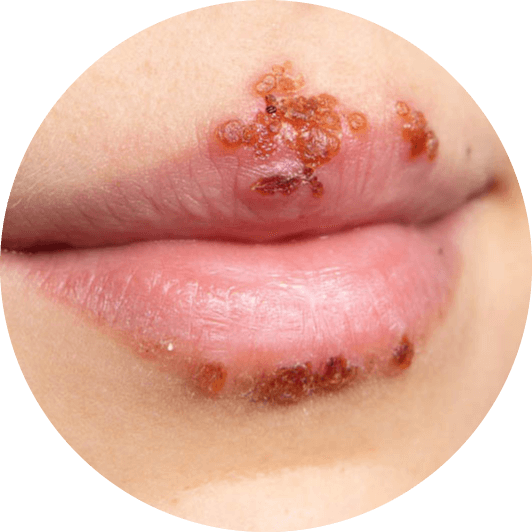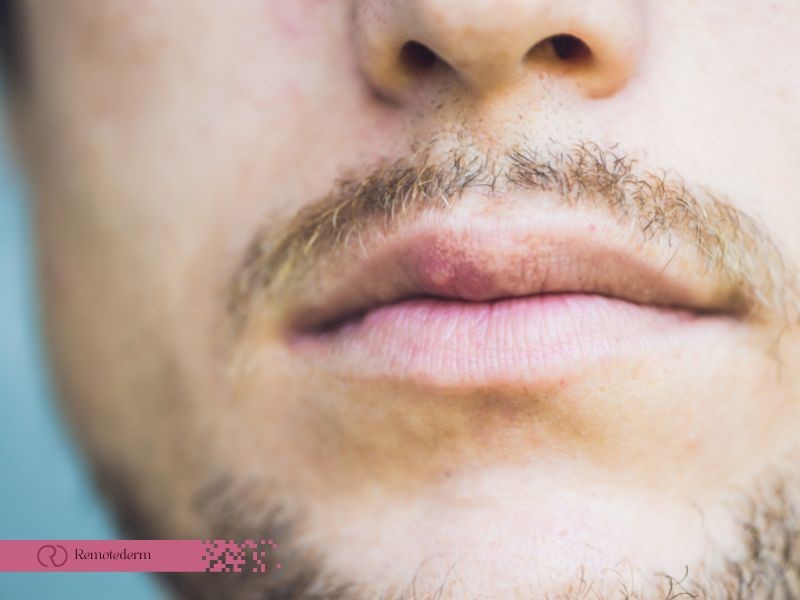Herpes is a common viral infection that affects millions of people worldwide. It is caused by the herpes simplex virus (HSV) and can lead to blisters or sores on the mouth, lips, or genitals, as well as flu-like symptoms during the first outbreak. While there is no cure for herpes, antiviral medications can help manage symptoms and reduce the risk of transmission. In this article, we will explore the causes, symptoms, treatment, and prevention of herpes simplex, as well as the challenges associated with managing this chronic infection.
What is Herpes?
Herpes is one of the common sexually transmitted skin diseases caused by the herpes simplex virus (HSV). There are two types of herpes viruses, HSV-1 and HSV-2, which can both cause herpes infections, but they differ in their symptoms and transmission methods.
Here are some key points to know about herpes:
- Herpes can cause blisters or sores on the mouth, lips, or genitals, as well as flu-like symptoms during the first outbreak.
- Herpes is spread through direct skin-to-skin contact with someone who has the virus, usually during sexual activity.
- Once someone is infected with herpes, the virus remains in their body for life and can cause recurrent outbreaks.
- While herpes cannot be cured, antiviral medications can help to reduce the frequency and severity of outbreaks.
- Using condoms during sexual activity can help to reduce the risk of transmitting herpes, but it may not always be effective since the virus can be spread through skin-to-skin contact outside of the condom-protected area.

It’s important to note that herpes is a common infection that affects millions of people worldwide. While it can be challenging to manage, with proper treatment and precautions, people with herpes can still lead healthy and fulfilling lives.
Causes of Herpes Simplex
The herpes simplex virus (HSV) is the primary cause of herpes simplex. HSV-1 is commonly spread through oral-to-oral contact, such as kissing or sharing utensils, while HSV-2 is primarily transmitted through sexual contact. The virus can also be spread by touching an open sore or blister caused by herpes, or by touching objects contaminated with the virus.
A person with herpes can transmit the virus even when they don’t have visible symptoms, making it difficult to prevent transmission. Certain factors can trigger outbreaks of herpes simplex, including stress, illness, hormonal changes, and exposure to sunlight or ultraviolet light. Once a person is infected with herpes simplex, the virus remains in their body for life and can reactivate at any time, causing new outbreaks of symptoms.

Herpes simplex is a common virus that can be transmitted through various forms of contact with an infected person or contaminated objects. While there is no cure for herpes, antiviral medications can help to manage symptoms and reduce the risk of transmission. Taking precautions during sexual activity and avoiding contact with open sores or blisters can also help to lower the risk of contracting the virus.
Symptoms of Herpes Simplex
Herpes simplex can cause a range of symptoms depending on where the infection occurs. While some people may not experience any symptoms or may only have mild symptoms, others may have severe symptoms that can affect their daily lives. Here are some more details on the symptoms of herpes simplex:
HSV-1 infection:
- Cold sores or fever blisters around the mouth are the most common symptom of HSV-1 infection. These small, fluid-filled blisters can be painful and may crust over as they heal.
- Swollen lymph nodes in the neck may also be a symptom of HSV-1 infection.
- Painful blisters on the lips or inside the mouth can make eating, drinking, and talking uncomfortable.
- Some people may experience a tingling or itching sensation in the affected area before the blisters appear.

HSV-2 infection:
- Painful blisters or sores on the genitals or anus are the most common symptom of HSV-2 infection. These blisters can be painful and may take several weeks to heal.
- Swollen lymph nodes in the groin may also be a symptom of HSV-2 infection.
- Pain or burning sensation during urination is another common symptom of HSV-2 infection.
- Some people may experience flu-like symptoms, such as fever and body aches, during their first outbreak of HSV-2 infection.

It’s important to note that some people with herpes simplex may not experience any symptoms at all, making it difficult to know if they are infected. Additionally, the symptoms of herpes simplex can vary in severity and frequency, with some people experiencing frequent outbreaks while others may only have one outbreak in their lifetime.
Treatment of Herpes Simplex
While there is currently no known cure for herpes simplex, there are several antiviral medications available that can help manage the symptoms and reduce the frequency and severity of outbreaks. These medications work by inhibiting the virus from multiplying in the body, which can help lessen the duration and intensity of symptoms.
Commonly used antiviral medications for treating herpes simplex include acyclovir, valacyclovir, and famciclovir. These medications can be administered orally in pill form or applied topically to the affected area as a cream or ointment.

Aside from prescription medication, there are also home remedies that can be employed to manage the symptoms of herpes simplex. One of the most important things to do is to keep the affected area clean and dry, which can help prevent further irritation and promote faster healing. Applying a cold compress to the affected area can also help alleviate pain and inflammation.
During outbreaks, it is advisable to avoid sexual contact as the virus can be easily transmitted through skin-to-skin contact. However, if sexual contact cannot be avoided, it is important to use a condom to reduce the risk of transmission. It is also recommended to avoid any activities that can weaken the immune system, such as smoking, excessive drinking, and stress, as a strong immune system is essential in managing herpes simplex outbreaks.
Preventing Herpes Simplex
Preventing herpes simplex can be challenging since the virus is highly contagious and can be transmitted even when no symptoms are present. However, there are some steps that can be taken to reduce the risk of infection and transmission.
- Practice Safe Sex: The best way to prevent herpes simplex is to avoid sexual contact or have sex only with a partner who is not infected. Using condoms can also reduce the risk of transmission, although it is not 100% effective since the virus can be present in areas that are not covered by the condom.
- Get Tested: It is important to know your own and your partner’s herpes status before engaging in sexual activity. This can be done through blood tests or swabs of the affected area. If you or your partner has herpes, it is important to take precautions to prevent transmission.
- Avoid Touching the Affected Area: If you have herpes, avoid touching the affected area and wash your hands frequently to prevent the virus from spreading to other parts of your body or to other people.
- Avoid Sharing Personal Items: Do not share personal items such as towels, razors, or lip balms, as these items can transmit the virus.
- Manage Stress: Stress can weaken the immune system and trigger outbreaks of herpes. To reduce the risk of outbreaks, manage stress through relaxation techniques such as meditation or yoga, or by engaging in activities that you enjoy.
- Boost Your Immune System: A strong immune system can help prevent outbreaks of herpes simplex. Eat a healthy diet rich in fruits and vegetables, exercise regularly, and get enough sleep to keep your immune system strong.
- Avoid Contact with Open Sores: If you come into contact with someone who has an open sore, avoid touching the sore and wash your hands immediately afterward.

By taking these steps, it is possible to reduce the risk of infection and transmission of herpes simplex. However, it is important to remember that no prevention method is 100% effective, and the virus can still be transmitted even with precautions. If you have questions or concerns about herpes simplex or how to prevent it, talk to your healthcare provider.
Living with herpes simplex
Living with herpes can be challenging, as it can have a significant impact on your physical, emotional, and sexual well-being. However, with proper management and support, it is possible to live a full and healthy life.
One essential aspect of living with herpes is visiting a skin dermatologist. They can help diagnose and manage the condition, provide information on treatments and lifestyle changes, and monitor any potential complications. Regular visits to a dermatologist can also help identify any new outbreaks or changes in symptoms, allowing for prompt treatment.
In addition to seeking medical care, it’s essential to take care of your mental and emotional well-being. Many people with herpes experience feelings of shame, stigma, and anxiety, which can impact their overall quality of life. Seeking support from friends, family, or a therapist can help you cope with these emotions and develop strategies for managing stress.

It’s also important to practice safe sex and communicate openly with sexual partners about your condition. While herpes is a common and manageable condition, it can still be transmitted to others. Using condoms and avoiding sexual activity during outbreaks can help reduce the risk of transmission.
Overall, living with herpes requires a proactive approach to managing both the physical and emotional aspects of the condition. With proper care and support, it is possible to live a healthy and fulfilling life.
Final Thoughts
In conclusion, herpes simplex is a common viral infection caused by the herpes simplex virus (HSV), which can lead to blisters or sores on the mouth, lips, or genitals, as well as flu-like symptoms during the first outbreak. While there is no cure for herpes, antiviral medications can help manage symptoms and reduce the risk of transmission.

Patients can benefit from Remotederm Online dermatology consultation in the comfort of their homes, which can be especially helpful for those residing in remote areas. The service can provide fast and efficient medical advice and treatment plans, saving patients the time and hassle of traveling to a clinic. With proper treatment and precautions, people with herpes simplex can still lead healthy and fulfilling lives. It is important to take precautions during sexual activity and avoid contact with open sores or blisters to lower the risk of contracting the virus.
FAQs
1. Can Herpes Simplex be cured?
There is currently no known cure for herpes simplex, but antiviral medications such as acyclovir, valacyclovir, and famciclovir can help manage symptoms and reduce the frequency and severity of outbreaks.
2. How is herpes simplex diagnosed?
Herpes simplex can be diagnosed through a physical exam and a viral culture or blood test. It’s important to get tested if you suspect you may have herpes or have been exposed to someone with the virus.
3. Can herpes simplex be transmitted during pregnancy?
Yes, herpes simplex can be transmitted from a mother to her baby during childbirth. It’s important for pregnant women with herpes to discuss treatment options with their healthcare providers to reduce the risk of transmission.
4. Can herpes simplex cause other health problems?
While herpes simplex itself is not typically dangerous, it can increase the risk of other health problems such as HIV transmission and meningitis. It’s important to seek medical treatment if you experience symptoms of herpes simplex or suspect you may have been exposed to the virus.
5. Can someone with herpes simplex donate blood?
People with herpes simplex are generally not eligible to donate blood, as the virus can be transmitted through blood transfusions. However, in some cases, individuals with herpes simplex who have been symptom-free for a certain period of time may be eligible to donate blood.
